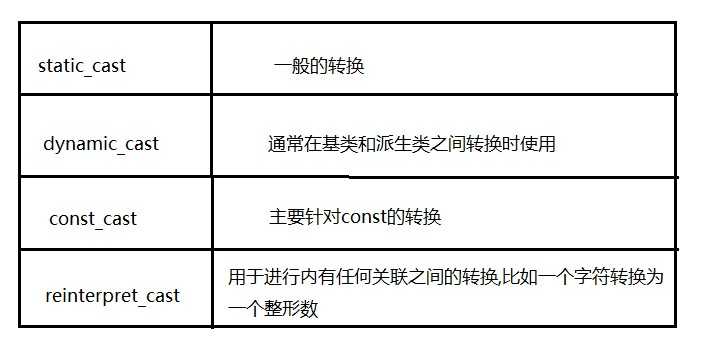标签:nio 建议 UNC 指针 erp 报错 div 子类 对象
c++提供四种类型转换

static_cast转换内置数据类型和具有继承关系的指针和引用
class Building{};
class Animal{};
class Cat :public Animal{};
void test01() { int a = 97; char c = static_cast<char>(a); cout << c << endl; //父类指针转换为子类指针 Animal *ani = NULL; Cat *cat = static_cast<Cat*>(ani); //子类指针转换为父类指针 Cat *soncat = NULL; Animal *anifather = static_cast<Animal*>(soncat); //引用 Animal aniobj; Animal &aniref = aniobj; Cat&cat = static_cast<Cat&>(aniref); Cat catobj; Cat&catref = catobj; Animal &anifather2 = static_cast<Animal&>(catref); }
dynamic_cast转换具有继承关系的指针或引用,在转换之前进行对象类型检查
子类指针可以装换为父类指针(从小到大),类型安全
父类指针转换为子类指针(从小到大),不安全
void test02()
{
Animal*ani = NULL;
Cat*cat = dynamic_cast<Cat*>(ani);//报错原因在于dynamic_cast做类型安全检查
Cat*cat = NULL;
Animal *ani = dynamic_cast<Animal*>(cat);
}
结论:dynamic只能转换具有继承关系的指针或者引用,并且只能由子类型转换成基类型
const_cast 指针 引用或者对象指针
增加或者去除变量的const性
void test03()
{
//1.基础数据类型
int a = 10;
const int &b = a;
int &c = const_cast<int&>(b);
c = 20;
//2.指针
const int*p = NULL;
int *p2 = const_cast<int*>(p);
int *p3 = NULL;
const int *p4 = const_cast<const int *>(p3);
}
reinterpret_cast强制类型转换 无关的指针类型 包括函数指针都可以
typedef void(*FUNC1)(int, int);
typedef int(*FUNC2)(int, char*);
void test04()
{
//1.无关的指针类型都可以进行转换
Building*building = NULL;
Animal* ani = reinterpret_cast<Animal*>(building);
//2.函数指针转换
FUNC1 func1;
FUNC2 fun2 = reinterpret_cast<FUNC2>(func1);
}
提示:必须清楚的知道要转变的变量,转换前是什么类型,转换后是什么类型
一般情况下,不建议类型转换,避免进行类型转换
标签:nio 建议 UNC 指针 erp 报错 div 子类 对象
原文地址:https://www.cnblogs.com/qq209049127/p/10732417.html